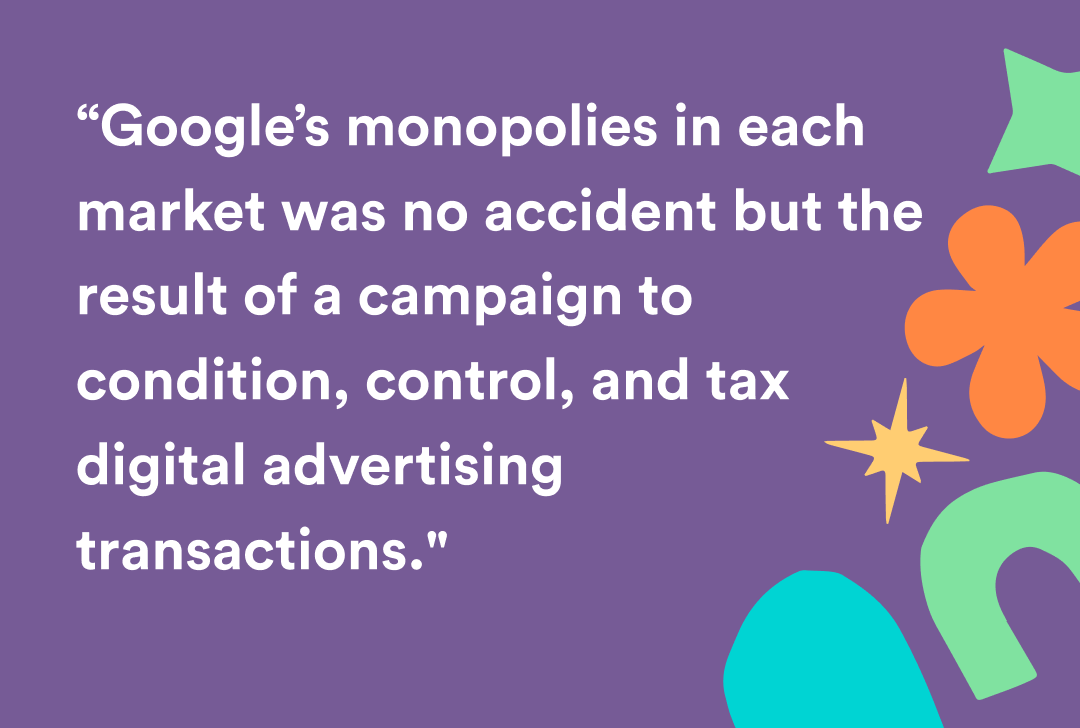Digital marketers around the world have been keeping a close eye on Google lately. But this time, it wasn’t nervously waiting for news about the algorithm updates. Everyone’s favorite search engine was recently alleged to have given itself an unfair advantage against other publishers when it came to ads.
Here, we’ll explain everything a digital marketer needs to know about the trial, as well as offer our own insights about what this could mean for the future of digital marketing.
Google antitrust lawsuit explained
Google’s antitrust trial started on Monday, September 9 2024 — and is predicted to last over a month.
Taking place in Alexandria, Virginia, the case will be decided by a judge and marks a very significant chapter in the Biden administration’s attempts to better control big tech.
The case is between Google and the Department of Justice (DOJ), and is the second time that the two have butted heads this year. On August 5 2024, a federal judge ruled that Google’s share in online searches and the advertising space was in violation of US competition law in a landmark case.
Unsurprisingly, the tech giant is planning to appeal this decision — as soon as this latest trial is over.
What is Google being accused of?
In the world of ad tech, publishers and advertisers rely on various tools and tech in order to place their ads in ideal locations around the internet. The tech in question is essentially the “middle man” between publishers looking to make money on ads, and the advertisers who want to buy the ad space.
Google’s ad exchange, known as AdX, allows sites to sell ad space on their websites to publishers, and also allows publishers to purchase ad space in an attempt to reach their target audience. Meanwhile, Google takes a fee from both publishers and advertisers — meaning that it wins from both sides.
This case is about the monopoly that Google has within this ad tech field.
During a pretrial filing, the DOJ said: “Google’s monopolies in each of these separate markets was no accident but rather the result of a campaign to condition, control, and tax digital advertising transactions over 15 years. This campaign was exclusionary, anticompetitive, and mutually reinforcing.”

What are the DOJ allegations?
The current trial between Google and the DOJ alleges that Google has been unlawfully leveraging its stake and position in the ad tech market to:
- monopolize ad servers
- monopolize ad network
- monopolize – or attempt to monopolize – ad exchanges, and
- unfairly tie its publisher and advertiser tools together.
Google’s ad tech offering — which is the crux of the case — brings in around 75% of all Google revenue. So, it’s a pretty big case.
What has Google said?
Understandably, Google has refuted all allegations and is ready to defend itself against the DOJ in the trial.
The day before the trial began (September 8), Google’s Vice President, Regulatory Affairs, Lee-Anne Mulholland, stated: “We compete in a flourishing market by offering ad tech that works and gives advertisers a good return on their investment.”
The blog post, titled Google competes by offering tools that deliver for both ad buyers and sellers, also states: “We give rivals access to our products even though American antitrust law doesn’t require it. It’s what our customers expect, and it helps the whole ads ecosystem.”
It seems that Google isn’t going to take these allegations lightly — so we can be prepared for further comments from key stakeholders to come out as the trial continues.
What does this mean for digital marketing?
To use the classic SEO response: it depends.

If the judge rules in favor of Google, then ad tech continues as normal. Publishers and advertisers will continue to use Google’s offering to buy and sell ad space on the internet, and Google will continue to take home a sizable commission that it pays itself.
However, if the DOJ comes out on top, then the future is a little more murky. Google’s AdX may not be able to continue running — certainly not as part of the larger Alphabet Inc conglomerate. And Alphabet may not even be willing to sell it to another company for AdX to continue running.
In this case, the tool may be forced into changing how it currently works and, in the worst case scenario, may well follow Universal Analytics and be shut down by Google.
Keep on top with expert advice
Navigating the ever-changing world of digital marketing is tough, especially when you’ve got a business to run. You may not have the time to pore over news articles and keep your finger on the pulse for every piece of marketing news that comes your way — and you may not even understand it.
That’s where we can help. We keep on top of this stuff, not just because we have to, but because we want to. Performance marketing is what we’re here for, so let us understand that part for you. We’ll just come to you with the distilled information and a strategy that will get you the results you want to see.
Reach out on LinkedIn, or schedule a free strategy session to chat about everything marketing!









